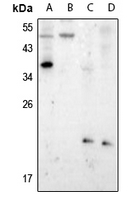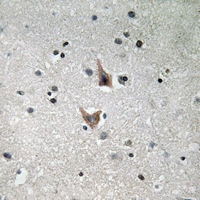Anti-Presenilin 1 (pS357) Antibody
Rabbit polyclonal antibody to Presenilin 1 (pS357)
- 产品详情
- 实验流程
- 背景知识
Application
| WB, IHC |
|---|---|
| Primary Accession | P49768 |
| Other Accession | P49769 |
| Reactivity | Human, Mouse, Rat, Monkey, Chicken |
| Host | Rabbit |
| Clonality | Polyclonal |
| Calculated MW | 52668 Da |
| Gene ID | 5663 |
|---|---|
| Other Names | AD3; PS1; PSNL1; Presenilin-1; PS-1; Protein S182 |
| Target/Specificity | KLH-conjugated synthetic peptide encompassing a sequence within the center region of human Presenilin 1 (pS357). The exact sequence is proprietary. |
| Dilution | WB~~WB (1/500 - 1/1000), IHC (1/50 - 1/200) IHC~~WB (1/500 - 1/1000), IHC (1/50 - 1/200) |
| Format | Liquid in 0.42% Potassium phosphate, 0.87% Sodium chloride, pH 7.3, 30% glycerol, and 0.09% (W/V) sodium azide. |
| Storage | Store at -20 °C.Stable for 12 months from date of receipt |
| Name | PSEN1 |
|---|---|
| Synonyms | AD3, PS1, PSNL1 |
| Function | Catalytic subunit of the gamma-secretase complex, an endoprotease complex that catalyzes the intramembrane cleavage of integral membrane proteins such as Notch receptors and APP (amyloid- beta precursor protein) (PubMed:10206644, PubMed:10545183, PubMed:10593990, PubMed:10811883, PubMed:10899933, PubMed:12679784, PubMed:12740439, PubMed:15274632, PubMed:20460383, PubMed:25043039, PubMed:26280335, PubMed:28269784, PubMed:30598546, PubMed:30630874). Requires the presence of the other members of the gamma-secretase complex for protease activity (PubMed:15274632, PubMed:25043039, PubMed:26280335, PubMed:30598546, PubMed:30630874). Plays a role in Notch and Wnt signaling cascades and regulation of downstream processes via its role in processing key regulatory proteins, and by regulating cytosolic CTNNB1 levels (PubMed:10593990, PubMed:10811883, PubMed:10899933, PubMed:9738936). Stimulates cell-cell adhesion via its interaction with CDH1; this stabilizes the complexes between CDH1 (E- cadherin) and its interaction partners CTNNB1 (beta-catenin), CTNND1 and JUP (gamma-catenin) (PubMed:11953314). Under conditions of apoptosis or calcium influx, cleaves CDH1 (PubMed:11953314). This promotes the disassembly of the complexes between CDH1 and CTNND1, JUP and CTNNB1, increases the pool of cytoplasmic CTNNB1, and thereby negatively regulates Wnt signaling (PubMed:11953314, PubMed:9738936). Required for normal embryonic brain and skeleton development, and for normal angiogenesis (By similarity). Mediates the proteolytic cleavage of EphB2/CTF1 into EphB2/CTF2 (PubMed:17428795, PubMed:28269784). The holoprotein functions as a calcium-leak channel that allows the passive movement of calcium from endoplasmic reticulum to cytosol and is therefore involved in calcium homeostasis (PubMed:16959576, PubMed:25394380). Involved in the regulation of neurite outgrowth (PubMed:15004326, PubMed:20460383). Is a regulator of presynaptic facilitation, spike transmission and synaptic vesicles replenishment in a process that depends on gamma-secretase activity. It acts through the control of SYT7 presynaptic expression (By similarity). |
| Cellular Location | Endoplasmic reticulum. Endoplasmic reticulum membrane; Multi-pass membrane protein. Golgi apparatus membrane; Multi-pass membrane protein. Cytoplasmic granule. Cell membrane; Multi-pass membrane protein. Cell projection, growth cone. Early endosome. Early endosome membrane; Multi-pass membrane protein. Cell projection, neuron projection. Cell projection, axon {ECO:0000250|UniProtKB:Q4JIM4}. Synapse {ECO:0000250|UniProtKB:Q4JIM4}. Note=Translocates with bound NOTCH1 from the endoplasmic reticulum and/or Golgi to the cell surface (PubMed:10593990). Colocalizes with CDH1/2 at sites of cell-cell contact. Colocalizes with CTNNB1 in the endoplasmic reticulum and the proximity of the plasma membrane (PubMed:9738936). Also present in azurophil granules of neutrophils (PubMed:11987239). Colocalizes with UBQLN1 in the cell membrane and in cytoplasmic juxtanuclear structures called aggresomes (PubMed:21143716). |
| Tissue Location | Detected in azurophile granules in neutrophils and in platelet cytoplasmic granules (at protein level) (PubMed:11987239) Expressed in a wide range of tissues including various regions of the brain, liver, spleen and lymph nodes (PubMed:7596406, PubMed:8574969, PubMed:8641442). |
Research Areas
For Research Use Only. Not For Use In Diagnostic Procedures.
Application Protocols
Provided below are standard protocols that you may find useful for product applications.
BACKGROUND
KLH-conjugated synthetic peptide encompassing a sequence within the center region of human Presenilin 1 (pS357). The exact sequence is proprietary.
终于等到您。ABCEPTA(百远生物)抗体产品。
点击下方“我要评价 ”按钮提交您的反馈信息,您的反馈和评价是我们最宝贵的财富之一,
我们将在1-3个工作日内处理您的反馈信息。
如有疑问,联系:0512-88856768 tech-china@abcepta.com.
¥ 1,500.00
Cat# AP61273























 癌症的基本特征包括细胞增殖、血管生成、迁移、凋亡逃避机制和细胞永生等。找到癌症发生过程中这些通路的关键标记物和对应的抗体用于检测至关重要。
癌症的基本特征包括细胞增殖、血管生成、迁移、凋亡逃避机制和细胞永生等。找到癌症发生过程中这些通路的关键标记物和对应的抗体用于检测至关重要。 为您推荐一个泛素化位点预测神器——泛素化分析工具,可以为您的蛋白的泛素化位点作出预测和评分。
为您推荐一个泛素化位点预测神器——泛素化分析工具,可以为您的蛋白的泛素化位点作出预测和评分。 细胞自噬受体图形绘图工具为你的蛋白的细胞受体结合位点作出预测和评分,识别结合到自噬通路中的蛋白是非常重要的,便于让我们理解自噬在正常生理、病理过程中的作用,如发育、细胞分化、神经退化性疾病、压力条件下、感染和癌症。
细胞自噬受体图形绘图工具为你的蛋白的细胞受体结合位点作出预测和评分,识别结合到自噬通路中的蛋白是非常重要的,便于让我们理解自噬在正常生理、病理过程中的作用,如发育、细胞分化、神经退化性疾病、压力条件下、感染和癌症。







